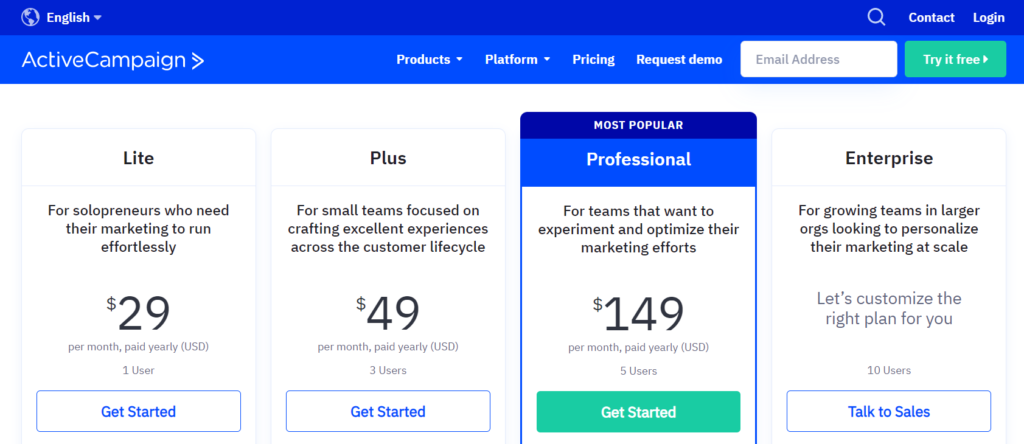ActiveCampaign is an all-in-one marketing automation platform that helps businesses of all sizes create targeted campaigns, automate their marketing processes, and grow their customer base. Here’s my review of ActiveCampaign based on its pricing, pros, and cons, what it’s best for, and its alternatives.
Pricing
ActiveCampaign offers four pricing plans based on the number of contacts you have and the features you need. Their plans start at $29/month for one user and go up to $149/month for five users. They also offer a custom enterprise plan for businesses with more than 50,000 contacts.

Pros
- All-in-one platform: ActiveCampaign offers a complete suite of marketing automation tools, including email marketing, CRM, marketing automation, and messaging.
- User-friendly interface: ActiveCampaign has a user-friendly interface that’s easy to use, even for beginners.
- Personalization: ActiveCampaign allows you to personalize your campaigns based on customer behavior, interests, and preferences.
- Integrations: ActiveCampaign integrates with over 800 apps and tools, including Shopify, Salesforce, and WordPress.
Cons
- Pricing: Activecampaign’s pricing plans can be costly, especially for businesses with a large number of contacts.
- Limited reporting: ActiveCampaign’s reporting features are limited compared to other marketing automation platforms.
- Learning curve: ActiveCampaign’s extensive feature set can be overwhelming for new users.
Key Features

- Email Marketing: ActiveCampaign provides a powerful email marketing platform that includes drag-and-drop email design, automation workflows, and A/B testing capabilities.
- Marketing Automation: ActiveCampaign offers advanced automation tools that enable users to create complex automation workflows based on triggers and actions.
- CRM and Sales Automation: ActiveCampaign includes a CRM platform that allows users to manage leads, contacts, deals, and tasks. It also provides sales automation tools that help users automate their sales processes, such as lead scoring and pipeline management.
- Messaging and Conversations: ActiveCampaign includes a messaging platform that allows users to engage with customers through email, chat, SMS, and social media.
- Personalization: ActiveCampaign offers a range of personalization features, such as dynamic content, conditional messaging, and personalized recommendations.
- Analytics and Reporting: ActiveCampaign provides detailed analytics and reporting that enable users to track and analyze the performance of their marketing campaigns, automation workflows, and sales processes.
- Integrations: ActiveCampaign integrates with a wide range of third-party tools and platforms, including CRMs, e-commerce platforms, social media channels, and payment gateways.
Best for…
ActiveCampaign is best for small to medium-sized businesses that need a comprehensive marketing automation platform that can help them personalize their campaigns, engage their customers, and grow their business. It’s ideal for businesses that rely heavily on email marketing and want to automate their marketing processes.
Alternatives:
- HubSpot: HubSpot offers a similar set of marketing automation tools to ActiveCampaign, but with more advanced features like lead scoring and attribution reporting. However, it can be more expensive than ActiveCampaign.
- Mailchimp is a popular email marketing platform that also offers basic marketing automation features. It’s best suited for small businesses that need a simple, user-friendly platform to manage their email campaigns. However, it may not be as powerful or comprehensive as ActiveCampaign.
